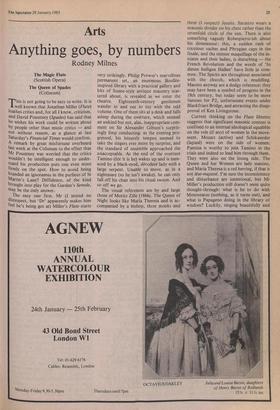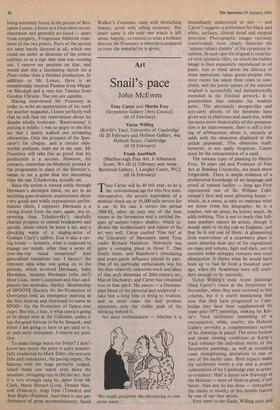Arts
Anything goes, by numbers
Rodney Milnes
The Magic Flute (Scottish Opera)
his is not going to be easy to write. It is well known that Jonathan Miller (Flute) loathes critics and, for all I know, criticism, and David Pountney (Spades) has said that he wishes his work could be written about by people other than music critics — and not without reason, as a glance at last Saturday's Financial Times would confirm. A remark by great misfortune overheard last week at the Coliseum to the effect that Mr Pountney was worried that the critics wouldn't be intelligent enough to under- stand his production puts one even more firmly on the spot. How to avoid being branded an ignoramus in the purlieus of St Martin's Lane? Diffidence, of the kind brought into play for the Garden's Semele, may be the only answer.
The easy one first. Mr (I intend no disrespect, but 'Dr' apparently makes him feel he's being got at) Miller's Flute starts very strikingly. Philip Prowse's marvellous permanent set, an enormous Boullee- inspired library with a practical gallery and bits of Soane-style antique masonry scat- tered about, is revealed as we enter the theatre. Eighteenth-century gentlemen wander in and out to toy with the odd volume. One of them sits at a desk and falls asleep during the overture, which seemed an unkind but not, alas, inappropriate com- ment on Sir Alexander Gibson's surpris- ingly limp conducting: as the evening pro- gressed, his leisurely tempos seemed to take the singers ever more by surprise, and the standard of ensemble approached the unacceptable. At the end of the overture Tamino (for it is he) wakes up and is men- aced by a black-eyed, decollete lady with a large serpent. Unable to move, as in a nightmare (so he isn't awake), he can only fall off his chair into his ritual swoon. And so off we go.
The visual references are by and large those of Moritz Zille (1866). The Queen of Night looks like Maria Theresa and is ac- companied by a bishop, three monks and three (I suspect) Jesuits. Sarastro wears a masonic divider on his chest rather than the sevenfold circle of the sun. There is also something vaguely Robespierre-ish about his demeanour; this, a sudden rash of tricolour sashes and Phrygian caps in the finale, and the sinister maquillage of the in- itiates and their ladies, is disturbing — the French Revolution and the words of 'In diesen heiligen Hallen' have little in com- mon. The Spirits are throughout associated with the church, which is muddling. Masons anyway are a dodgy reference: they may have been a symbol of progress in the 18th century, but today seem to be more famous for P2, unfortunate events under Blackfriars Bridge, and attracting the disap- proval of Ken Livingstone.
Current thinking on the Flute libretto suggests that significant masonic content is confined to an internal ideological squabble on the role (if any) of women in the move- ment. Mozart (active) and Schikaneder (lapsed) were on the side of women: Pamina is worthy to join Tamino in the trials and indeed to lead him through them. They were also on the losing side. The Queen and her Women are lady masons, and Maria Theresa is a red herring, if that is not lese-majeste. I'm sure the inconsistency and disturbance are intentional, but Mr Miller's production still doesn't seem quite thought-through: what is he to do with Monostatos (nothing, as it turns out), and what is Papageno doing in the library of wisdom? Luckily, singing beautifully and
being extremely funny in the person of Ben- jamin Luxon, a boon in a Flute short on en- chantment and generally po-faced — apart from sprightly, Fringesome Millerish treat- ment of the two priests. Parts of the second act seem barely directed at all, which one could see either as direction of the utmost subtlety or as a sign that time was running out. I reserve my position on that, and would dub this a fascinating sketch for a Flute rather than a finished production. In addition to Mr Luxon, there is an exceptionally musical Pamina from Marga- ret Marshall and a very fair Tamino from Gordon Christie. The rest are capable.
Having interviewed Mr Pountney in order to write an appreciation of his work for another magazine, I know perfectly well that he will find my reservations about his Spades wholly irrelevant. 'Reservations' is putting it mildly: I was so angry in the first act that I nearly walked out screaming obscenities. Only the prospect of the Spec- tator's fat cheque, and a certain olde- worlde politesse, kept me in my seat. Mr Pountney will take this as proof that his production is a success. However, his scenario, somewhat im-Modestly printed in the programme in place of the librettist's, seems to me a great deal less interesting than the one Tchaikovsky actually set.
Since the action is viewed solely through Hermann's deranged mind, we are in an anything-goes situation: expressionist decor (very good) and wildly expressionist perfor- mances (ditto, I suppose). Hermann is a raving loonie from the start, again, less in- teresting than Tchaikovsky's carefully charted progress to mental breakdown and suicide, about which he knew a lot, and a shocking waste of a singing-actor of Graham Clark's calibre. Lisa is also a rav- ing loonie — honestly, what is supposed to engage our minds, other than a series of over-the-top visual sensations? And generalised sensations too: I haven't the remotest idea what was going on in the prelude, which involved Hermann, baby Hermann, mummy Hermann (who she?) three Lisas, three Countesses and four card- players (no mishtake, shadly). Membership of SPOOVE (Society for the Protection of Overtures) held an emergency meeting in the first interval and shortened its name to SPOO-- for the Protection of Opera tout court. But this, I fear, is what opera is going to be about now at the Coliseum, unless it has the good fortune to be by Janacek, and either I am going to have to get used to it, or seek early retirement. I reserve my posi- tion.
To make things worse (or better? I don't know any more) the piece is quite wonder- fully conducted by Mark Elder, the textures lithe and translucent, the pacing urgent, the balance with the stage perfectly judged, which made one regret even more the senseless, swingeing cuts in the last act. And it is very strongly sung by, apart from Mr Clark, Marie Slorach (Lisa), Donald Max- well (Yeletsky), Alap Opie (Tomsky) and Jean Rigby (Pauline). And there is one per- formance of great accomplishment: Sarah Walker's Countess, sung with bewitching beauty, acted with telling economy. Her death scene is the only one which is left alone, happily, to remind us what a brilliant director Mr Pountney is when he is prepared to trust the material he is given.







































 Previous page
Previous page